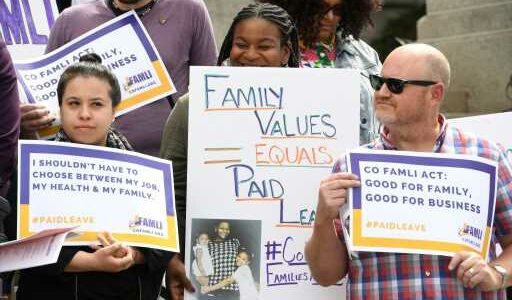
Colorado family leave: Payroll deductions to start in January
Colorado workers should see a new deduction on their paychecks starting in January, and if their employers are on top of things, it won’t come as a complete surprise.
Voters passed Proposition 118 in November 2020, which creates a state program to provide up to three months, or in some limited cases up to four months, of paid family leave for workers who needed to step away from their jobs for a variety of reasons — a new child, caring for a seriously ill family member and dealing with severe health problems, domestic violence or military deployment.
“We were tasked by voters to make sure we had a system ready for employers to register and on Dec. 1 we rolled it out,” said Tracy Marshall, director of the Family & Medical Leave Insurance (FAMLI) at the Colorado Department of Labor and Employment, which is overseeing the program.
All employers in the state, an estimated 200,000 establishments, must register with FAMLI by the end of the first quarter. Marshall said registering can be done online in about 12 minutes and as of Dec. 19 about 18,000 firms had already registered. Employers should also be actively making their employees aware of the program and they must start collecting contributions in the new year.
Effectively a form of social insurance, FAMLI is funded through a 0.9% payroll levy, with half of the total coming from the employee and half from the employer. Firms with fewer than 10 employees are exempt from providing a match, but they must still collect employee contributions and forward those on.
Local government can opt out of the program and companies with private leave plans that are equal to or better than what the state is requiring can choose to keep what they have. Self-employed workers can also participate, but that option won’t be available until later next year or in 2024.
Although employers have the next three months to register, they must start collecting contributions in January and remit those to the state by the end of April. Come 2024, the state will start making payments to workers who are approved to take a leave of absence, although specific details on that are still being hammered out.
Large employers are up to speed and so are most payroll providers, said Lenora Plimpton, an attorney with Fortis Law Partners in Denver. But the same can’t be said for small businesses.
“I don’t have a sense that small businesses are very well aware of it,” Plimpton said. The message she tries to get across to clients is that they need to notify their employees about the program so they aren’t surprised when they see a new item on their paychecks.
Employers must post a notice in the workplace or if workers are remote, they must post something electronically, say on the company intranet. They must also notify any new hires in writing about the program and their eligibility. They must also provide a direct notice if they learn an employee is likely to be eligible for leave.
Plimpton said the state has done a good job of providing resources to explain the program and its requirements, enough so that most employers won’t need to seek legal help.
“The resources and website are great — there is a guide and forms. Even with our clients, I will send them directly to the forms. A business won’t even need to hire an attorney,” she said.
Among the concerns businesses have expressed about the program, aside from the additional work required, is that it creates an incentive for workers to take the full 12 weeks of leave rather than negotiate an arrangement that works for both sides.
Marshall said because FAMLI is paying the worker on leave, an employer can use the salary that might have otherwise been paid to hire a replacement or fund additional hours for current workers. Workers are guaranteed their same position or a similar one upon return from leave.
Another concern surrounds the long-term solvency of the program, but Marshall said projections have the program adequately funded as designed from when it starts paying out in 2024.
Source: Read Full Article